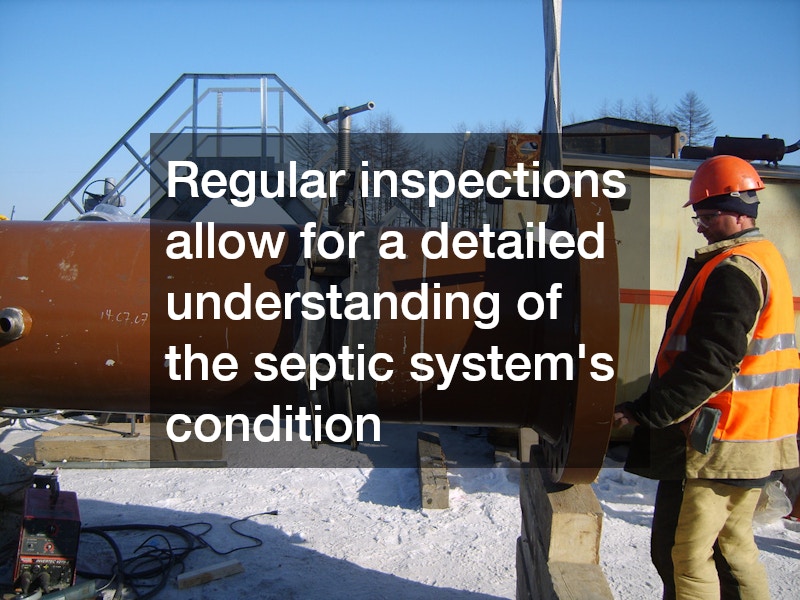
How Septic Tank Inspections Save You Time and Stress
Maintaining a home’s septic system is often out of sight and out of mind, yet septic tank inspections play a crucial role in keeping a property safe, functional, and healthy. A failing or neglected septic system can lead to costly repairs, environmental hazards, and even health risks for a household. This is why professional inspections are so important.
Unlike a quick visual check, a professional inspection evaluates the overall condition of the tank, drainage field, and system components to catch small issues before they become major problems.
Septic systems play a crucial role in managing wastewater for homes not connected to a municipal sewer system. Regular inspections can prevent costly repairs and provide peace of mind to homeowners. Explore the importance of septic tank inspections, focusing on the various ways they save you time and reduce stress.
Warning Signs That Your Septic Tank Needs Inspection
Homeowners should be aware of indicators that suggest a septic tank inspection is necessary. Signs can include slow drains, foul odors, or unusual wet spots in the yard.
Recognizing these signs early can prevent more significant problems down the line. Many homeowners are unaware that observing changes in drain performance or unusual smells might indicate a more severe issue with their septic system. Prompt attention to these symptoms is crucial for maintaining the health of your system.
Additionally, the appearance of lush, green patches in the yard can signal a potential leak in the septic system. Such leaks may lead to wastewater accumulation on the surface, posing health risks and attracting unwanted pests. Being vigilant about these warning signs not only protects your property but also contributes to overall community health.
How Often You Should Get Your Tank Inspected
Understanding the frequency of septic tank inspections is essential for maintenance. Factors like household size, septic system type, and usage can influence how often you should schedule an inspection.
Typically, a septic tank should be inspected every three to five years, depending on various factors. For homes with larger families or heavy water usage, more frequent inspections may be necessary to ensure everything operates smoothly. Knowing the right timeline can prevent potential issues before they escalate.
For homeowners using an aerobic treatment unit, the inspection frequency might increase to once a year due to the complexities involved in their operation. The type of septic system significantly affects its maintenance needs, making it vital for every homeowner to tailor their inspection schedule accordingly.
What a Septic Tank Inspection Involves
A comprehensive septic tank inspection includes assessing the tank’s condition, checking for leaks, and evaluating the drain field. Knowing what the process entails can alleviate concerns.
The inspector will typically begin by examining the accessibility of the tank and checking for any visible signs of damage or wear. The condition of the inlet and outlet pipes, as well as the baffles that help segregate solids from liquids, will also be evaluated. This thorough checking helps address issues before they can disrupt the system.
Additionally, the inspector will measure the sludge levels within the tank to determine if it needs pumping. Keeping sludge levels in check prevents clogs from developing downstream, which can cause significant system failures. Familiarity with this process helps demystify septic tank inspections, making homeowners feel more at ease.
How Septic Tank Inspections Can Prevent Future Problems
Regular inspections can identify and address minor issues before they become major problems, saving homeowners time and stress in the long run. This section will explore how proactive inspections can mitigate risks.
By catching small issues early, homeowners can often make minor adjustments or repairs instead of facing potentially catastrophic failures. Regular inspections allow for a detailed understanding of the septic system’s condition, enabling homeowners to plan for necessary maintenance tasks accordingly.
This proactive approach eliminates the worry and anxiety of sudden system failures, which can lead to septic backup into homes or contamination of groundwater. Understanding the risks and benefits of inspections allows homeowners to take charge of their septic systems and maintain a smoother home operation.
Regular septic tank inspections are essential to prevent issues, ensuring the system’s longevity and functionality. By being proactive, homeowners can save time, reduce stress, and protect their investment.
The peace of mind gained from knowing that your septic system is in good condition far outweighs the minimal costs associated with inspections. With regular checks, homeowners can avoid being caught off guard by unexpected problems.
By prioritizing septic tank inspections as part of home maintenance habits, homeowners not only secure their property but also contribute to their overall quality of life. Investing in routine inspections is a step toward responsible and sustainable living.
Professional septic tank inspections are an essential part of responsible homeownership, ensuring that one of the most critical systems on a property remains in safe and efficient working order. By identifying potential problems early, inspections help prevent expensive repairs, protect the environment, and safeguard the health of your household. While it may be tempting to overlook this hidden system, the long-term benefits of regular professional evaluations far outweigh the short-term costs. Investing in routine septic inspections not only provides peace of mind but also extends the life of your system, making it a wise and practical choice for every homeowner.


